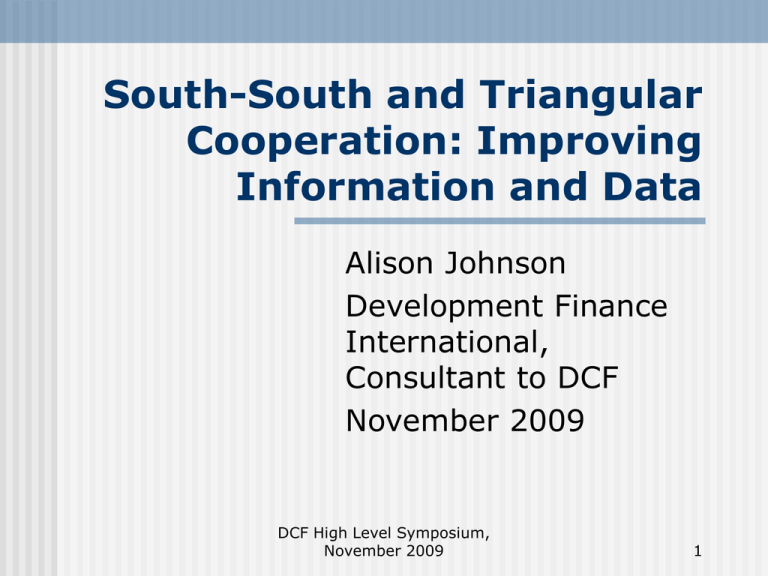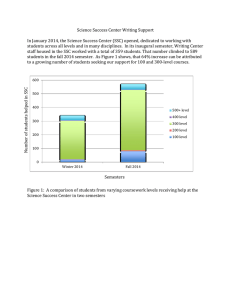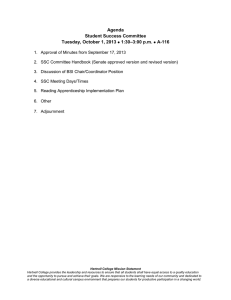South-South and Triangular Cooperation: Improving Information and Data Alison Johnson
advertisement

South-South and Triangular Cooperation: Improving Information and Data Alison Johnson Development Finance International, Consultant to DCF November 2009 DCF High Level Symposium, November 2009 1 Introduction South-South Cooperation (SSC) has a long and proud history as an important form of solidarity between countries. For the international community to acknowledge accurately its increasing role and importance, there needs to be better and more comprehensive information and data. It is recognised that SSC has considerable advantages and better information will benefit partner countries in seeking most cost effective and appropriate funding. DCF High Level Symposium, November 2009 2 Principles underlying SSC The principles of solidarity and mutual cooperation underlie SSC and as such it is a broader and deeper concept that Northern donor aid. It encompasses financial flows (eg loans and grants) as well as the sharing of experiences, technology and skills transfers, preferential market access and trade-oriented support. However for UN DCF to strengthen information and data flows, the initial emphasis is to be narrowed to focus on financial SSC and triangular flows. DCF High Level Symposium, November 2009 3 Proposal for defining SSC -1 The principle is that it represents a genuine transfer of resources from the country offering cooperation programmes into the economies of partner countries. It is defined to include grants and concessional loans (including export credits) provided by one Southern country to another to finance projects, programmes, technical cooperation, debt relief and humanitarian assistance. DCF High Level Symposium, November 2009 4 Proposal for defining SSC -2 Southern actors offering SSC are Southern governments and their agencies and Southern multilateral institutions. Southern actors receiving SSC are Southern governments and their agencies, multilateral development institutions (eg World Bank, UN), regional development banks (eg AsDB, AfDB), other multilateral institutions and CSOs. The concessionality of SSC loans is to be designed to measure the opportunity cost of the funds to the lender. DCF High Level Symposium, November 2009 5 Proposal for defining SSC -3 Triangular cooperation is Northern donors, multilateral institutions and Southern partners providing cooperation to one Southern partner to execute projects/programmes with the aim of assisting a third Southern partner country. Since Northern donors and multilateral institutions account for their triangular flows as Northern donor aid including these flows as part of SSC would result in double-counting. However Northern donors are to be encouraged to provide better reporting on their triangular flows. DCF High Level Symposium, November 2009 6 Proposal for data compilation To have a comprehensive and consistent overview of SSC, it is important to have the following annual data: New commitments in aggregate and by concessionality, type of cooperation, sector and receiving partner country Gross and net disbursements in aggregate and by concessionality, type of cooperation, sector and receiving country. These data will enable the computation of benchmarks to better understand SSC and ways to maximise its impact. Data on SSC is to be collected on a voluntary basis. DCF High Level Symposium, November 2009 7 Proposal for SSC database Voluntary reporting of SSC data would be a twostaged process: Compilation by Southern countries of national data on a voluntary basis and on the basis of the agreed data concepts and definitions for SSC. Reporting of nationally compiled data in a standardised Excel-format to the DCF, which will be used in the overall reporting of SSC by the DCF. Draft database format in Excel has been prepared as part of the Study. DCF High Level Symposium, November 2009 8 Practical challenges for data compilation One of the main challenges is lack of a single government ministry or agency responsible for the country’s SSC programmes. So there is no overarching institutional structure for recording and monitoring SSC. On the other hand, a number of Southern countries have taken steps to strengthen institutional and data collection processes. Proposal for the way forward: A senior Southern country official, knowledgeable of the country’s cooperation programme, be nominated to facilitate national data collection and its reporting to the DCF on a voluntary basis, Support to be provided by the UN including through missions and email/telephone. DCF High Level Symposium, November 2009 9 Impact of SSC It is proposed to conduct analysis to learn and share good practices of SSC and triangular cooperation, for example an independent study to evaluate triangular cooperation and a repository of good practices in triangular cooperation to garner more information on the practical issues. DCF High Level Symposium, November 2009 10


